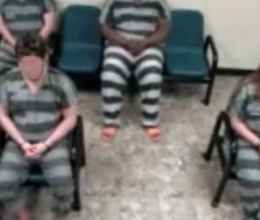
Time in Carswell's prison medical facility can be a death sentence for women prisoners.
By BETTY BRINK: Fort Worth Weekly
This is the prison at Carswell. ...We got an inmate who is not breathing. She's turning blue." The 911 tape was scratchy, but the words were clear.
"Are they doing CPR?" the Med-Star ambulance company operator asked.
"I assume so," the caller replied. "They've got about 90 people up there. ..."
Betty Appleby gets angrier and more frustrated each time she listens to the tape, describing key moments in a tragedy that would change her large, closely knit family forever.
"Can you believe that? Ninety people? I know that's an exaggeration by whoever's calling, but what it says to me is that a lot of people were tramping around that cell and destroying evidence that could have helped us find out exactly what happened to my sister so that we could see justice done. And get some peace."
Appleby is speaking of her youngest sister, Linda D'Antuono Fenton - the inmate who was "turning blue." On Feb. 23, 2004, Fenton was found unconscious and near death in a supposed high-security cell at Federal Medical Center Carswell - a prison that a federal judge two years earlier had allegedly ordered her removed from. She was two days away from being released, after serving almost seven years for a drug offense - two days before she could get out and, as she had promised in letters to her family and friends, tell the world about what was going on inside the Fort Worth federal prison hospital walls.
Fenton was 34 years old. In her last month at Carswell, she'd written her family long, excited letters about how happy she was to be almost done with prison, about finding a job and getting new clothes and starting fresh.
"Linda wanted to leave that place in style," Appleby said. "My mother had a limo hired to pick her up at the gate. But instead, she came home in a body bag."
The night of the 911 call, Fenton was taken to Fort Worth Osteopathic Medical Center. She died there eight days later, without ever regaining consciousness, with her family members at her bedside - and with shackles on her legs, two guards on duty to watch her. "She was in a coma, for God's sake," her brother said. "Where was the compassion for my mother? For us?"
The Tarrant County medical examiner's office ruled Fenton's death a suicide by hanging. But like just about everything else in the official record concerning the death, it's a ruling that Fenton's family and friends, and current and former inmates of Carswell, find impossible to believe.
Reports from inside the prison vary widely on almost every point: whether she had been suicidal, exactly how and in what condition she was found - and why she was where she was. Prison officials told the family that Fenton had become suicidal early on Feb. 23 and had been put on suicide watch - but her friends at the prison said Fenton was not suicidal and in fact was giddy with the thought of freedom. The cell in the Security Housing Unit where she was found was not the place where those on suicide watch were supposed to be held.
A Florida pathologist who performed a second autopsy concluded that Fenton's injuries were not consistent with suicide by hanging, but with being placed in a "lethal choke hold" like that taught to many prison guards and police officers - and which one former inmate said is used frequently at Carswell. Her clothes, which might have provided further evidence, disappeared. Hospital officials refused her family's request to examine her body for signs of sexual abuse.
Fenton never got out to raise the hell about prison conditions that she had threatened. But more than a year later, the controversies surrounding her death are serving the same purpose, shining a spotlight on Carswell, the federal Bureau of Prison's only medical and psychiatric hospital for women inmates - and indeed, on the treatment of women in other federal prison facilities.
The questions about Carswell go beyond those in Fenton's case. Nicole Vasquez, 27, and Mari Ayn Sailer, 29, died there in August and September, respectively, under questionable circumstances. Vasquez, a recent surgery patient, died of septic shock after prison medical personnel apparently ignored her pleas for help. In Sailer's case, the prison notified the Tarrant County medical examiner's office that it would send her body for an autopsy - and then reversed the decision. The prison told medical examiners they had decided not to do an autopsy, which is contrary to prison policy, according to Carswell spokesperson Deborah Denham. Only under pressure from Sailer's family did prison officials agree to do their own autopsy. The family is still waiting on the report.
Accusations of gross medical neglect, rape by prison guards, and toxic exposure for prison workers - problems that Fort Worth Weekly has been reporting on since 1999 - continue to pile up. In 1999, Beverly Joseph almost died from congestive heart failure after a physician's assistant diagnosed her severe chest pain as a urinary tract infection. Marilyn Shirley, a prisoner at the low-security camp just outside the hospital compound, was raped by a prison guard in 2000. The same year Janice Pugh died from brain cancer that was never treated. Tom Charles, a former Bureau of Prisons maintenance worker, is totally disabled after days of exposure to lead dust from working there in 1999. Today, Darlene Fortwendel is dying from untreated liver cancer. And the list goes on. More families, former inmates, and advocates are coming forward asking for answers and, thus far, getting precious few. Some still have family members confined there - including those whose limited prison sentences for nonviolent crimes threaten to become death sentences because of the failure of prison officials to provide proper care.
Carswell's response to questions about its medical care is boilerplate: "We provide care that is comparable to community standards," said Denham, executive assistant to Warden Ginny Van Buren, who does not give interviews. The Bureau of Prisons claims that the Carswell situation is unique because many of the women who are sent there have histories of long-term drug abuse or previously untreated illnesses due to poverty. "At Carswell," BOP spokesperson Mike Truman said, "many of these women are getting quality medical care for the first time in years."
Not true, said recently released inmate Dana Corum, a brittle diabetic whose own case of medical neglect was described by the Weekly in 2000. Because the hospital failed to provide her with proper medications and a diabetic diet, she is now in kidney failure. "The place is not getting better," she said. "What's worse now, the women who are dying are young, like Linda."
Brian McCarthy, the Florida pathologist who re-autopsied Fenton at the request of her family, said that her 102-pound body showed a "pattern of bruises" on her arms, neck and wrists that were "consistent with the effects of a physical struggle." His investigation, he wrote, led him to only one conclusion: "Linda Fenton's death ... was an act of premeditated murder."
Linda Fenton was no model prisoner at Carswell. She was combative - sometimes physically - and always willing to tell prison officials what she thought of them. Those tendencies had their roots in a condition she could not control. When she was 11, an auto accident put her in a coma for 10 days and left her with severe frontal-lobe head injuries. Her brother, Paul D'Antuono, said she subsequently developed Tourette's syndrome, a severe neurological disorder characterized by facial and body tics and often accompanied by compulsive utterances and obscenities. She spent the next six years in a psychiatric hospital under treatment for the condition. "Our mother moved to Fort Lauderdale [where the state hospital was located] so she could spend every day with Linda," D'Antuono said.
In a letter to the FBI, McCarthy explained that, although the condition did not impair Fenton's intellectual abilities, it made her "a loose cannon, capable of being verbally offensive, confrontational, and irritating" and "destined for chronic mental illness ... for the rest of her life." Fenton, the pathologist said, should never have been assigned to a place like Carswell, where "her emotional defects were not recognized and ... she was not given appropriate medical treatment."
Her siblings and friends said Fenton, nonetheless, had a keen intellect and was capable of being loving and kind, a devoted friend to fellow inmates. "Everybody loved that girl," Corum said.
Well, not everybody. She spent a lot of time in lockdown - in the Security Housing Unit, the same place where she would wind up with a sheet knotted around her neck. The SHU is an isolation unit for disruptive inmates or those who break the rules. Most often she was sent there as a result of mouthing off to guards and doctors. "The only difference between us and them," she wrote in a letter in 2001, "is they haven't had to stand in front of a judge, yet. I wouldn't let most of them take out the garbage or pull weeds in the yard. And I have a bad habit of telling them just what I think about them. Then when they lock me down for it I usually fight them. The way I think of it is, if I got to go down it's gonna be in a Blaze of Glory and I'm gonna take a few of them with me!! Right?!? ... I'm a Rebel Without a Cause, the only cause I have is Be-cause it's the principle of the matter!!"
Then, in a chilling foretelling of her death, Fenton wrote that she didn't think she would leave the prison alive. "I honestly don't know if I'm gonna be able to make it through this ... I think this place is gonna end up killing me, and I'm gonna end up dying in prison way out here in Texas all by myself."
At Carswell, Linda's verbal battles were primarily waged against her psychiatrist, Carswell chief of psychiatry William Pederson, and one guard.
One incident, involving another guard, was witnessed by Fenton's mother and stepfather when they came to spend time with her on her birthday in 2003. As they waited for her to be brought to the visitor's room, they heard a commotion, and Linda started screaming in the hall. She had said something to set off one of the guards, who threatened to take her back without allowing her to see her parents. According to her stepfather, Fenton told the guard, "I know I'm an inmate, but I'm a human being." The guard yelled, "You are not an inmate or a human being. You are a psychotic and a fucking lunatic. If you don't shut your fucking mouth, I will rearrange your fucking face." Fenton's stepfather, Bill Brown, complained about the incident in a July 3, 2003, letter to BOP director Harley Lappin, but got no reply.
Fenton's distrust of Pederson was well known to her family and her inmate friends. She complained regularly about his attempts to force her to take two powerful anti-psychotic drugs, Haldol and Thorazine, which her medical records show she was allergic to. Yet in 2002, Pederson went to federal court seeking a judge's order to compel her to take the medications. The court denied the request and instead ordered the prison agency to transfer Fenton out of Carswell, according to Fenton's mother, Dorothy Brown. Fenton told her mom that the judge said she needed to be in a less-stressful environment and recommended a low-security prison camp. BOP never complied with the order.
Denham declined to answer questions about Pederson or his treatment of Fenton. All she is allowed to say, Denham replied via e-mail, is that Pederson is a psychiatrist at the prison.
Requests by the Weekly to interview Pederson were also turned down. Denham is the only person authorized to speak for the prison, she said.
Fenton had also written that she was going to sue Pederson as soon as she got out, along with "a whole lot of women here that are planning on bringing suit against him for malpractice."
"Linda was not suicidal. "She was ready to go home."
The inmate was adamant about her friend - outraged enough to risk writing to a reporter, but worried enough about retribution to ask that her name not be revealed. "There is more to her story, and it is probably connected to the rapes here," she wrote. She didn't elaborate, but the Weekly has documented one rape and at least seven cases of sexual misconduct at Carswell that have led to prison terms or firings for the men involved. "They did not protect her," the inmate wrote of Fenton. "She is the only prisoner I have ever known who was put on suicide watch and left unattended."
Whether or not Linda Fenton had threatened suicide is only the first of many questions about what happened in the last few days of her life. And on this, as many other points, the information provided by prison officials to civilian doctors and to Fenton's family is full of discrepancies.
Because prison officials declined to speak with the Weekly about Fenton's case - and, by press time, the BOP had not fulfilled an open records request for copies of public portions of her file - much of the official version of events is gleaned from what Fenton's family was told and from Fenton's treatment record at the Fort Worth Osteopathic Medical Center. Her family provided the Weekly with copies of the doctor's reports and the Tarrant County medical examiner's autopsy.
Osteopathic doctors, according to those records, were told by prison authorities that Fenton had "a history of suicide attempt by hanging." But in the same paragraph, the civilian doctor also wrote, "apparently the patient has been making suicidal threats for several days, but she has no previous history of prior attempts."
Christopher McGee, the Carswell social worker assigned to Fenton, told her family a week after Fenton's death that there had been no suicide attempts. Family members said McGee told them that Fenton was put in SHU because, after a going-away party planned by Fenton's inmate buddies was inexplicably cancelled by Pederson, Fenton "lost it," becoming angry and combative. He did tell them she was on 24-hour watch, which contradicts a guard's report that she was alone when she was found, as well as the osteopathic doctor's determination that she had been comatose for the better part of an hour before efforts to save her began.
McGee was not available for comment.
Former inmate Dana Corum and a current prisoner, who has asked to remain anonymous for fear of retribution, both told the Weekly that the word among other inmates at the prison hospital was that Fenton was in the SHU on suicide watch because she was afraid to go home - a contention disputed by Fenton's letters as well as by her family and friends.
Tonya Wrisley shared the psychiatric unit at Carswell with Fenton for the last three months of Fenton's life. "We were very close friends," she said recently from her home near Portland. The two women spent "a lot of time together and confided in each other," Wrisley said. She too had heard that Fenton killed herself out of fear of going home, a tale Wrisley dismissed out of hand. "Linda was so excited about going home. She had made all these plans about what she was going to do, and she had everything ready. I will never believe she killed herself."
Indeed, her long hand-written letters to her mother and other family members from that period paint a picture of a woman excited and full of hope for a new life free of the drugs and fast living that had landed her in prison.
"Linda was happy, excited; she just wanted to do her mission," Wrisley said.
That "mission," Linda's sister, Betty Appleby, said, was to work with at-risk kids to keep them out of jail. "There is no way Linda would have taken her own life," Appleby said. "She was coming home in two days. She had survived that place, and she was so excited to be finally getting out."
Fenton had already arranged for job training in her mother's hometown of Inverness, Fla., and had a letter of acceptance into a Salvation Army program that helps ex-cons find work. In her last letters home, she asked her mother to get her a training manual so she could get a Florida driver's license. She even asked Dorothy to spray perfume on new clothes she was sending for Linda to wear home.
"After all those years in prison," Appleby said, "she wanted to feel her femininity again. It may seem silly, but that broke my heart when I read it. Those weren't the words of someone planning to kill herself in a few days."
If Fenton was suicidal, her treatment by Carswell prison personnel violated the Bureau of Prison's written policy on suicide intervention. The BOP policy states that any inmate threatening self-harm must be placed in a special "suicide watch room" and be kept under 24-hour observation. That room is not in SHU - and in fact the policy states that if an inmate is already in the SHU at the time of a suicide threat, she must be removed immediately to the designated room, where the person watching her "will have verbal communication with and CONSTANT observation of the suicidal inmate at all times." (BOP emphasis.) The policy is also clear that if an inmate does commit suicide, the place where she is found must be preserved as a crime scene and all evidence preserved. Denham said the Carswell prison follows the BOP policy to the letter.
Nonetheless, prison officials told Osteopathic Medical Center doctors that the inmate was alone "at the time of this incident." Doctors estimated that Fenton had probably been unconscious and in respiratory distress for half an hour to 45 minutes before anyone intervened to attempt resuscitating her.
Another former Carswell inmate who is now a university professor said that if Fenton had been on suicide watch, she wouldn't have been left alone for half an hour or more, nor would she have had a regular sheet with which to hang herself. BOP rules confirm that a suicide-watch room was not supposed to contain sheets.
"Those on suicide watch would be put in there with paper blankets and have [other] prisoners sit outside the Plexiglas and watch them 24/7," she wrote. The ex-inmate, who asked that her name not be used because she still fears retaliation, was sometimes one of those asked to sit and watch those troubled women.
On the other hand, she said, it's possible that Fenton was subjected to a choke hold. "They are routinely used on male and female prisoners alike to subdue them," she said.
In Fenton's case, prison officials' accounts also differ about what they found when they finally came to see about her. According to the records, prison officials told the osteopathic hospital personnel that Fenton was found "hanging by a bed sheet" which is also reflected in the Tarrant County medical examiner's report. Not so, McGee, the social worker, told Fenton's family a week later. According to relatives, McGee said Fenton was found lying on the bed with a sheet knotted around her neck so tightly that paramedics had to cut it off.
Appleby said McGee "rather nonchalantly" told the family that Fenton couldn't have hanged herself because there was nothing in the cell to which she could have tied the sheet in order to do that.
"None of the stories add up," Paul D'Antuono said. "Do you see why we're suspicious?"
There are lots of people suspicious about the Carswell prison camp and hospital these days, including the families of two young women who died there within the last few months.
Nicole Vasquez was 27, two months away from her release date after serving time on a drug charge; she died Aug. 1. Mari Ayn Sailer, 29, had served a year of her 18-month sentence for tax fraud when she died on Sept. 12. Inmate witnesses say that, in the days leading up to the deaths, both women repeatedly begged prison medical personnel for help, but neither received it.
"The medical officer always sent them back untreated," said Corum, who knew both women.
In the strange world of the prison hospital, medical care for those considered to have less-serious health problems consists of an inmate getting herself from her own floor to the "medical" floor to stand in line to ask for help -- or to sit in line in a wheelchair.
Darlene Fortwendel, an ex-inmate suffering from a rare form of liver cancer, knows first-hand about Carswell's medical "care." She finally won a compassionate release from Carswell a month ago after seven months in which prison hospital doctors refused to treat her cancer. She was there when Vasquez died.
Vasquez, who suffered from lupus, had had heart surgery in late 2004 in a Connecticut hospital while serving time at the federal prison there. She was sent to Carswell for follow-up care.
"She had complained of severe aches and fever," Fortwendel said, but when Vasquez went to sick call, she received only over-the-counter meds, which seemed to be of little help. In spite of Fortwendel's own illness, she and Corum and others in the fifth-floor chronic care section of the hospital did their best to take care of Vasquez. "She was very sick, and there is no nurse on duty on that floor," Fortwendel said. If an inmate gets in distress, the only persons near enough to help them are the guards or their fellow inmates.
Vasquez died in the night "throwing up all over herself," Corum said.
Prison spokesman Mike Truman said an autopsy showed Vasquez died of septic shock. According to the National Institutes of Health web site, septic shock is the result of an overwhelming infection that can develop after surgery.
Sailer's family, in contrast, doesn't even have an autopsy report. They still don't know why she died. Her brother, Bruce Sailer, is sure he is being lied to about her death. She entered Carswell as a psychiatric patient, having suffered much of her life from depression and bipolar personality disorder, but was physically healthy, Bruce said. "My sister was only 29," he wrote in an e-mail to the Weekly. Twenty-nine-year-olds "don't just die in their sleep. ... I'm scared that I will never find out why my sister died."
Another inmate who knew Sailer said she died after being found unconscious in her bed and that the equipment needed to resuscitate her was not available on her floor.
When asked for a copy of Sailer's autopsy report, prison spokeswoman Denham referred the Weekly to the Tarrant County medical examiner because that office "did the autopsies on all deaths at the prison." But not Sailer's, it seems. Elvela Young, who handles records for the medical examiner's office, said that, just as personnel from that office were expecting to autopsy Mari Ayn, the prison called and stopped it. "We never got the body," Young said. "They took jurisdiction back." And in spite of Denham's statement, Young said, "We haven't done [autopsies of women who died at the prison] in many years."
Bruce Sailer wrote that when he asked why the prison had taken the body back, he was told it was because "there was no blunt trauma to her body, and therefore no foul play, and no autopsy was necessary."
"I clearly stated to the people at Carswell that my family wants an autopsy," he wrote. The prison then agreed to do one, he said, but told him it would take "four to six weeks" for an autopsy report to be released before he could learn her cause of death. So far all he has received is a form letter from the prison saying she died because "her heart stopped." What the prison has done, he said, "is just wrong, and I'm sure illegal."
Denham said that in all deaths at a federal prison, no matter the cause, an autopsy is required. The prison agency's web site states that, "If there is not obvious traumatic injury, a complete autopsy report bearing original signatures and notarized must be provided." Denham said Sailer's autopsy has not been released.
The ex-inmate who is now a university professor said that medical conditions in Carswell's psych ward were so unbelievable when she was there from 2002 until her release last year that she sometimes thinks she dreamed it. She herself was never confined there, but said she was sometimes recruited to help watch those on the lock-down floor. "Some of these women were locked in essentially Plexiglas cages," she said. "Some were naked, had thrown food at the walls and floors and even feces."
Corum, who was still in Carswell when Sailer died, vividly remembered the younger woman's suffering. "She kept telling [the medical officers] on the medical floor that she was sick," Corum said, "and they kept sending her back to her floor without treating her." She was sleeping in a large dormitory-like room with about 10 other beds, Corum said. "When she was found, they took her out on a stretcher with an oxygen mask on her face." Not long after her body was removed, Corum said, "FBI agents were running around all over the place."
In recent weeks, still other families have come forward with allegations of egregious medical neglect against inmates who are still alive - but whom their loved ones fear will not survive to be released. All are women who have been convicted of non-violent drug or white-collar crimes.
Some like Nina Baum Best of New York were sent to Carswell after being injured in other prisons. She was sentenced to 18 months for passport fraud in November, 2004. "She was healthy and walking that day in the courtroom," her brother David Baum wrote in an e-mail. After nearly a year in the custody of the BOP, she is now in a wheelchair, requires the use of a catheter, and is suffering from a variety of debilitating ailments, some so severe that David Baum fears she will die in prison. He also charges that many of her injuries were inflicted by her prison caregivers.
Best's troubles began at Danbury Federal Prison in Connecticut, her brother said, where over a period of three weeks, she was "beaten around the head and thrown into the SHU, shackled naked in the shower, put in a straitjacket, and denied food." The inhumane treatment was inflicted, he said, as punishment for minor infractions. When she found she couldn't urinate after a long lock-down period in which she had little food and water "she was refused a catheter, leaving her in excruciating pain," her brother wrote. Now, she has bladder damage and cannot urinate without a catheter.
When his sister was sent to Carswell, Baum said, the family was encouraged, because they believed she would finally be treated humanely and receive decent care. But at Carswell, he said, she has been "caught between incompetence and malice." Not long after she arrived, she contracted shingles and is in constant pain with little or no treatment, he said, and she is still regularly sent to the SHU, even though she is in a wheelchair. "Worst of all," Baum said, "she is losing hope."
Billy Wilson's sister, Evelyn Jones, was diagnosed with a "rare form of gallbladder cancer" in July while serving time at the Bryan Federal Prison Camp in College Station, he said. She was sent to Carswell, basically to die, Wilson wrote in an e-mail. "The initial prognosis [for life] was two weeks." Three months later she is still alive, Wilson points out, even though Carswell had put her in its hospice program and refused to give her any kind of treatment other than pain meds. The family asked for a second opinion. It took over a month, Wilson wrote, for the hospital to arrange a PET scan. After that, her prognosis was changed to say that she has four to six months to live.
"Our family feels that there is a possibility that the doctors [who gave the first prognosis] were wrong and that if my sister had been given treatment immediately, she might have had a fighting chance to live ... . I feel she is on the track to become the next victim of the prison system at Carswell."
Now, the family's hope hinges on a compassionate release request that they made through FedCure, a nonprofit group that assists in helping families of those in prison. "If we could get her released," Wilson said, "we think we could get her some treatment that would extend her life." As of this writing, the family is still waiting.
The repeated cases of medical neglect and sexual misconduct have put Carswell on the radar screen of several prison reform groups. FedCure and the American Bar Association's Correction and Sentencing Committee, led by such advocates as former Justice Department attorney Margaret Love, are lobbying for sentencing reform and expanded conditions for early release for non-violent prisoners who are ill, dying, elderly or have young children. So far, however, their efforts have had little result in Congress, even though Love said "the courts are ready, and most U.S. attorneys are ready."
On the other hand, Stop Prison Rape last year convinced Congress to pass the first comprehensive prison rape prevention act in the nation's history - with help from the testimony of Carswell rape survivor Marilyn Shirley.
Linda Fenton's family is no longer expecting any justice from Carswell. They are convinced that prison officials have covered up the true circumstances of her death. "We're not about to rest or stop until all of those involved in Linda's death are held accountable and the prison shut down," Appleby said.
Her brother Paul has pushed the FBI to open an investigation. The family has hired the same law firm that two years ago won a $4 million judgment for ex-inmate Marilyn Shirley against the Carswell prison guard who has also been convicted in criminal court of raping her.
Paul D'Antuono said he thinks he's beginning to get the picture of what may have happened to his baby sister. "She was a fighter," he said. "She wasn't afraid of anyone. ...She would get in your face and tell you just what she thought of you or what you were doing, no matter the outcome." And often, he said, her language was blue. "Unlike you or me," he said, "Linda couldn't help herself."
Her brother is sure that she would have fought "like a tiger" when they tried to lock her in the SHU and believes guards could have killed her in trying to control her. Or, he said, her death could have been intentional.
Immediately after Fenton's death, the family asked that she be examined to determine if she had been sexually assaulted. A hospital official refused, saying the family would first have to file a police report.
"The family had no reason to believe that [rape] had occurred," the doctor wrote. But he also noted that "They were however concerned in regards to bruises on her hips and a bump on her head." A search for semen was never done, another investigative lapse that makes Appleby angry. "Why would we have to file a police report to get them to pick up a Q-tip and do a swab? How much trouble could it be?"
When McCarthy, the Florida pathologist, wrote to the FBI requesting an investigation, he noted that "The entire crime scene was ... handled with a lack of professionalism."
McCarthy's postmortem exam and his own investigation led him to conclude not only that Fenton had died following a "physical struggle and placement of a police choke hold," but that she had in fact been murdered.
McCarthy and Paul D'Antuono both believe there were staff members at Carswell who had reason to fear Fenton's return to the outside world. She had made no secret of the fact that she was going to blow the whistle on what she claimed were medical malpractice and other wrongdoings at the prison. "I'm gonna get in touch with all the major networks," she wrote in one letter, "and let the American public know what kind of things not only Dr. [Pederson]but the entire prison system has been doing to us, all at the taxpayer's expense."
Now, her brother said, "We will never know what Linda knew. Or even why she died, unless someone is willing to come forward. Someone out there knows the truth."







